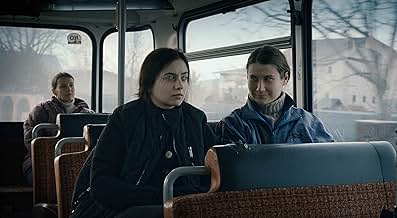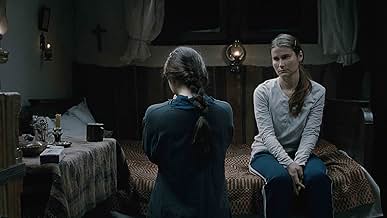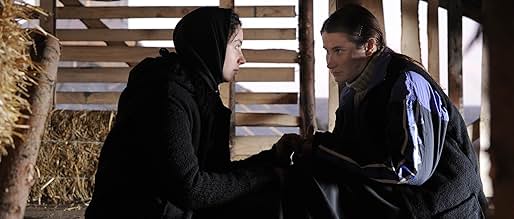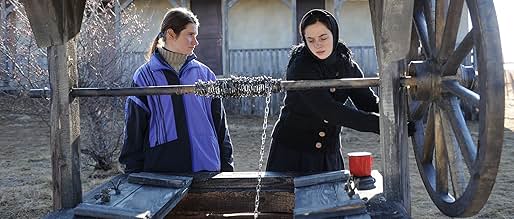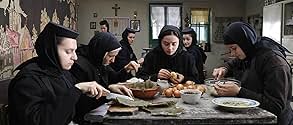AVALIAÇÃO DA IMDb
7,5/10
14 mil
SUA AVALIAÇÃO
A amizade entre duas jovens que cresceram no mesmo orfanato: uma delas encontrou refúgio em um convento na Romênia e se recusa a ir embora com sua amiga, que agora mora na Alemanha.A amizade entre duas jovens que cresceram no mesmo orfanato: uma delas encontrou refúgio em um convento na Romênia e se recusa a ir embora com sua amiga, que agora mora na Alemanha.A amizade entre duas jovens que cresceram no mesmo orfanato: uma delas encontrou refúgio em um convento na Romênia e se recusa a ir embora com sua amiga, que agora mora na Alemanha.
- Direção
- Roteiristas
- Artistas
- Prêmios
- 8 vitórias e 19 indicações no total
Valeriu Andriuta
- Priest
- (as Valeriu Andriutã)
- Direção
- Roteiristas
- Elenco e equipe completos
- Produção, bilheteria e muito mais no IMDbPro
Avaliações em destaque
'Based on a true story' – a phrase that can cover so many bases - is the slow-burning and languorous Romanian film Beyond the Hills.
Set predominantly in a monastery in a bleak and poverty-stricken district, it is a complex and multi-layered film revolving around two young women, Alina and Voichita. Previously childhood friends then lovers, their lives intertwine once more when Alina returns from working in Germany in an attempt to once more enter into a relationship with Voichita who has since taken Holy Orders and is living the chaste and extremely frugal life of a nun. The rekindling of the relationship was always doomed and as Alina's mental health deteriorates with the realisation that she will not achieve her objective, she provokes a series of events culminating in the belief by some that she is possessed and needs cleansing.
A Romanian film about faith, despair and unrequited lesbian love in an impoverished monastery was never likely to be an action-packed, sensationalist blockbuster. It is long at 155 minutes and its pace tends to alternate between dead slow and stop. It's the sort of a film which will take over 5 minutes to show a nun leaving the kitchen to draw water from the well and return to the kitchen with no dialogue or plot advancement throughout that period. But it is a film that has the courage to take its time, confident that it can draw you into the lives of the people whose story it tells. And on the whole it succeeds.
There are no real villains or heroes in the film. It does not take the easy route to mock and blame religion for out-dated belief – when a nun believes she has been sent a sign from God and goes all peculiar, the Orthodox Priest in charge cuts down the hysteria curtly and tells her and the other nuns to move on. No, the people shown in this film, be they doctors, police or those of the cloth, are portrayed as well-meaning individuals all looking to do no harm even if, like all of us, they can be judgmental and self-righteous on occasion. Beyond the Hills is an unashamedly bleak and ultimately very sad film which gives no answers but merely records events leaving its audience to draw their own conclusions.
Cinematography was good, though the constant sound of the ever-blowing wind was sometimes crude and off-putting.
And there was an early failure of the sub-titles. When Alina first arrives at the monastery, the camera concentrates on a hand-written sign at its entrance. It's clearly of some import for it to be shown so, but the audience is not let in on its message. Post-film research ascertained it stated, words to the effect: This is the House of God. Forbidden to those of different religion. You must believe and not doubt. It would have explained much.
Set predominantly in a monastery in a bleak and poverty-stricken district, it is a complex and multi-layered film revolving around two young women, Alina and Voichita. Previously childhood friends then lovers, their lives intertwine once more when Alina returns from working in Germany in an attempt to once more enter into a relationship with Voichita who has since taken Holy Orders and is living the chaste and extremely frugal life of a nun. The rekindling of the relationship was always doomed and as Alina's mental health deteriorates with the realisation that she will not achieve her objective, she provokes a series of events culminating in the belief by some that she is possessed and needs cleansing.
A Romanian film about faith, despair and unrequited lesbian love in an impoverished monastery was never likely to be an action-packed, sensationalist blockbuster. It is long at 155 minutes and its pace tends to alternate between dead slow and stop. It's the sort of a film which will take over 5 minutes to show a nun leaving the kitchen to draw water from the well and return to the kitchen with no dialogue or plot advancement throughout that period. But it is a film that has the courage to take its time, confident that it can draw you into the lives of the people whose story it tells. And on the whole it succeeds.
There are no real villains or heroes in the film. It does not take the easy route to mock and blame religion for out-dated belief – when a nun believes she has been sent a sign from God and goes all peculiar, the Orthodox Priest in charge cuts down the hysteria curtly and tells her and the other nuns to move on. No, the people shown in this film, be they doctors, police or those of the cloth, are portrayed as well-meaning individuals all looking to do no harm even if, like all of us, they can be judgmental and self-righteous on occasion. Beyond the Hills is an unashamedly bleak and ultimately very sad film which gives no answers but merely records events leaving its audience to draw their own conclusions.
Cinematography was good, though the constant sound of the ever-blowing wind was sometimes crude and off-putting.
And there was an early failure of the sub-titles. When Alina first arrives at the monastery, the camera concentrates on a hand-written sign at its entrance. It's clearly of some import for it to be shown so, but the audience is not let in on its message. Post-film research ascertained it stated, words to the effect: This is the House of God. Forbidden to those of different religion. You must believe and not doubt. It would have explained much.
Well,I wanted desperately, not to like, to love this movie... All the premises were there, I couldn't wait for the film to be released... But, as the film was developing in front of my eyes, I was completely feeling less...No attachment to the girls, I didn't even care for one damn second about any of them, the film scratches everything that is supposed to carve upon, the director seems in a hurry to reach something that slips between his fingers...I felt no compassion for that girl, in some moments I was about to scream to her, get out of that place, girl, return to Germany, live your life and put ourselves out of the misery of watching this movie!And one more thing. The performances of both girls, cumulated, multiplied by 100, they never, ever, never ever, are any close to the magnificent performance of Emanuelle Riva in Amour... So , Nanni Moretti, I don't really know what came to your mind when you gave that award to these two, frustrating the beautiful Riva of that super-deserved award
It is a sad story told in a fair way. You see the two characters desperately trying to save each other, but also desperately trying to keep themselves into the "safe bubble" they created around them: Voichita's bubble is the monastery, Alina's bubble is Voichita, the only human being that ever loved her.
It is the story of two girls who grew up in an orphanage (I felt a shiver trying to imagine it) and had few choices at the moment they became adults. The movie lefts many questions open. One of them, the hardest perhaps, is how was it possible that nobody (monastery, hospital, school, foster family, police, etc.) was able to help a girl, while everybody agreed on the fact that she needed help.
It is the story of two girls who grew up in an orphanage (I felt a shiver trying to imagine it) and had few choices at the moment they became adults. The movie lefts many questions open. One of them, the hardest perhaps, is how was it possible that nobody (monastery, hospital, school, foster family, police, etc.) was able to help a girl, while everybody agreed on the fact that she needed help.
A girl visits a convent to try and bring her friend home.
Starring Cosmina Stratan and Cristina Flutur.
Written by Cristian Mungiu. Inspired by the Non Fiction Novels of Tatiana Niculescu Bran.
Directed by Cristian Mungiu.
This is a dark and disturbing movie that would have been far better if it wasn't so slow paced.
It moves at a snails pace but maybe that's what Cristian Mungiu intended, after all I'm guessing that's how things flow in a convent. The story isn't bad and as far as I could tell ( this was a Romanian movie with English subtitles) the acting was okay without being incredible.
I liked the outside location cinematography but the indoor stuff looked a bit wobbly. This is an arty film and usually I like anything like this but for me this was too slow and bordering on boring. For me it lacked something but I'm not sure what. Maybe the relationship between the two main characters could have been explored more to make this more watchable? We only get a few suggestions of a love affair in the past between them both and so perhaps that's what this movie needed.
It does make you think. It's pretty much an anti religious movie and that's the message that came across clearly at the end.
7/10
Starring Cosmina Stratan and Cristina Flutur.
Written by Cristian Mungiu. Inspired by the Non Fiction Novels of Tatiana Niculescu Bran.
Directed by Cristian Mungiu.
This is a dark and disturbing movie that would have been far better if it wasn't so slow paced.
It moves at a snails pace but maybe that's what Cristian Mungiu intended, after all I'm guessing that's how things flow in a convent. The story isn't bad and as far as I could tell ( this was a Romanian movie with English subtitles) the acting was okay without being incredible.
I liked the outside location cinematography but the indoor stuff looked a bit wobbly. This is an arty film and usually I like anything like this but for me this was too slow and bordering on boring. For me it lacked something but I'm not sure what. Maybe the relationship between the two main characters could have been explored more to make this more watchable? We only get a few suggestions of a love affair in the past between them both and so perhaps that's what this movie needed.
It does make you think. It's pretty much an anti religious movie and that's the message that came across clearly at the end.
7/10
A KVIFF viewing of Romanian auteur Cristian Mugiu's latest gripping modern exorcism tale which has garnered two wins in Cannes this year, a BEST SCREENPLAY award and the young pair Cosmina Stratan and Cristina Flutur shared Best Actress honor, which staunchly vindicates Cristian's consistent excellence not only in his fine-tempo and well-pitched directing bent, but a robust script and ultra-overpowering cast as a whole superlative pack.
Like his breakthrough chef-d'oeuvre 4 MONTHS, 3 WEEKS AND 2 DAYS (2009, a 9/10), the film anew grapples with the contentious subject-matters (this time it is about religious belief) and assigns two young girls in the main roles. The film acquaints its viewers with a secluded locale, an austere monastery (with no electricity and utilizing well water for example) is in stark contrast to the contemporary modernity, then slowly unwinds a tug-of-war in the name of love between God and human, a hapless destiny falls upon 2 girls from the same orphanage, one has become a pious nun so far, yet another is an obstinate non-believer, who chooses God as her love competitor and defies any compromise.
There is an unremitting impulse of captivation throughout the entire film which successfully banishes the awareness of its 150-minutes length. One of Mungiu's trump card is his virtuoso camera deployment, which has again fixated on a well-organized angle, especially in the indoor scenes, all the inconsequential items have been placed into incessant expositions of still paintings.
A strong-arm tension has been outstandingly established among three main characters (the said two girls plus the priest), although a few well-worn plot twists-and-turns may not survive the hindsight, however the eventual repercussion is nothing if not astonishing.
Much accolades should be granted to the film about its no shade of grey amplification of managing the thorny issue, the clear-minded of eschewing any grandiosity with a telling coda, which can never be less appreciated among cinephiles.
Like his breakthrough chef-d'oeuvre 4 MONTHS, 3 WEEKS AND 2 DAYS (2009, a 9/10), the film anew grapples with the contentious subject-matters (this time it is about religious belief) and assigns two young girls in the main roles. The film acquaints its viewers with a secluded locale, an austere monastery (with no electricity and utilizing well water for example) is in stark contrast to the contemporary modernity, then slowly unwinds a tug-of-war in the name of love between God and human, a hapless destiny falls upon 2 girls from the same orphanage, one has become a pious nun so far, yet another is an obstinate non-believer, who chooses God as her love competitor and defies any compromise.
There is an unremitting impulse of captivation throughout the entire film which successfully banishes the awareness of its 150-minutes length. One of Mungiu's trump card is his virtuoso camera deployment, which has again fixated on a well-organized angle, especially in the indoor scenes, all the inconsequential items have been placed into incessant expositions of still paintings.
A strong-arm tension has been outstandingly established among three main characters (the said two girls plus the priest), although a few well-worn plot twists-and-turns may not survive the hindsight, however the eventual repercussion is nothing if not astonishing.
Much accolades should be granted to the film about its no shade of grey amplification of managing the thorny issue, the clear-minded of eschewing any grandiosity with a telling coda, which can never be less appreciated among cinephiles.
Você sabia?
- CuriosidadesFilmed and edited simultaneously in chronological order.
- ConexõesFeatured in At the Movies: Cannes Film Festival 2012 (2012)
Principais escolhas
Faça login para avaliar e ver a lista de recomendações personalizadas
- How long is Beyond the Hills?Fornecido pela Alexa
Detalhes
- Data de lançamento
- Países de origem
- Centrais de atendimento oficiais
- Idioma
- Também conhecido como
- Beyond the Hills
- Locações de filme
- Campina, Romênia(location)
- Empresas de produção
- Consulte mais créditos da empresa na IMDbPro
Bilheteria
- Faturamento bruto nos EUA e Canadá
- US$ 124.919
- Fim de semana de estreia nos EUA e Canadá
- US$ 14.622
- 10 de mar. de 2013
- Faturamento bruto mundial
- US$ 673.493
- Tempo de duração2 horas 32 minutos
- Cor
- Mixagem de som
- Proporção
- 2.35 : 1
Contribua para esta página
Sugerir uma alteração ou adicionar conteúdo ausente

Principal brecha
By what name was Além das Montanhas (2012) officially released in India in English?
Responda

